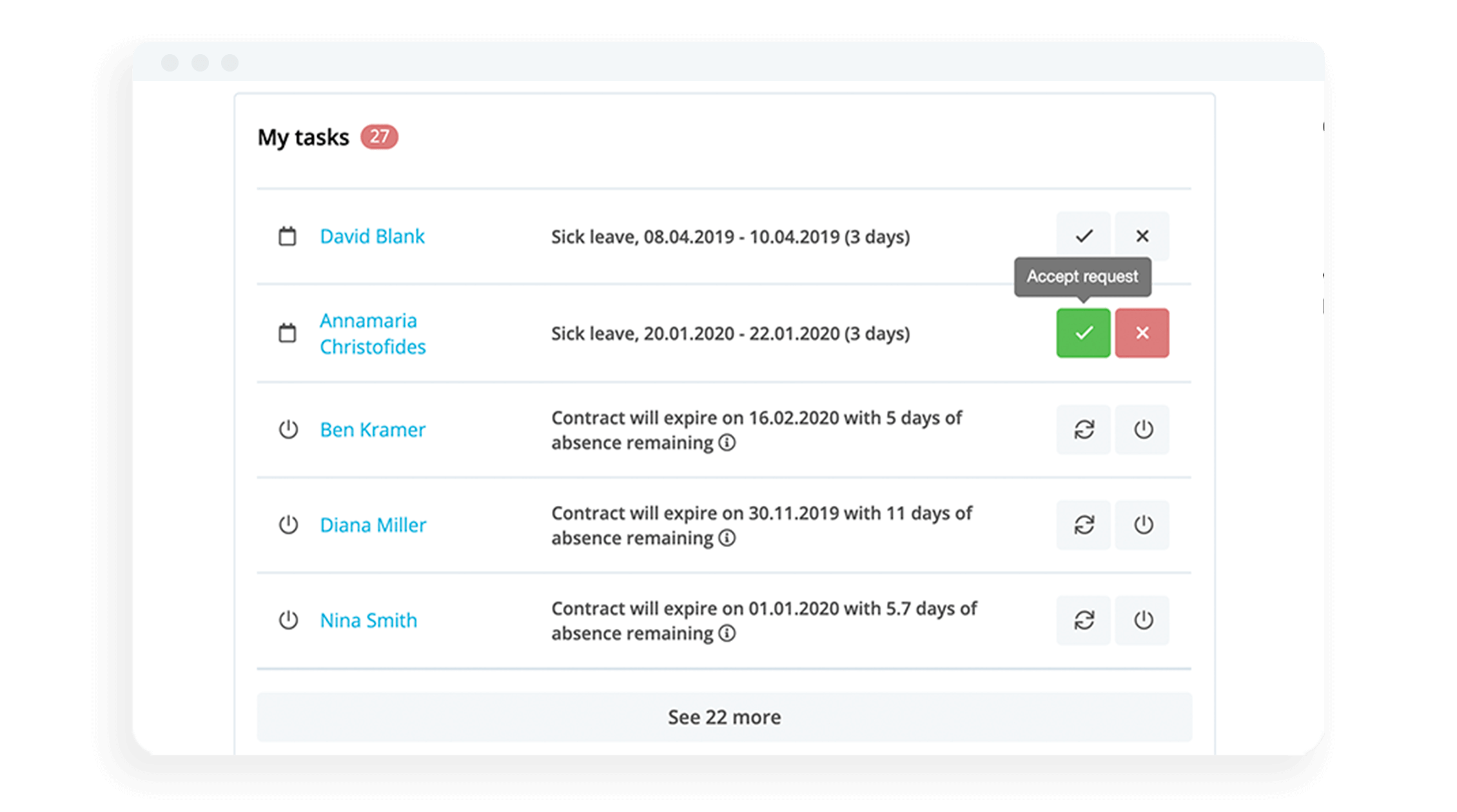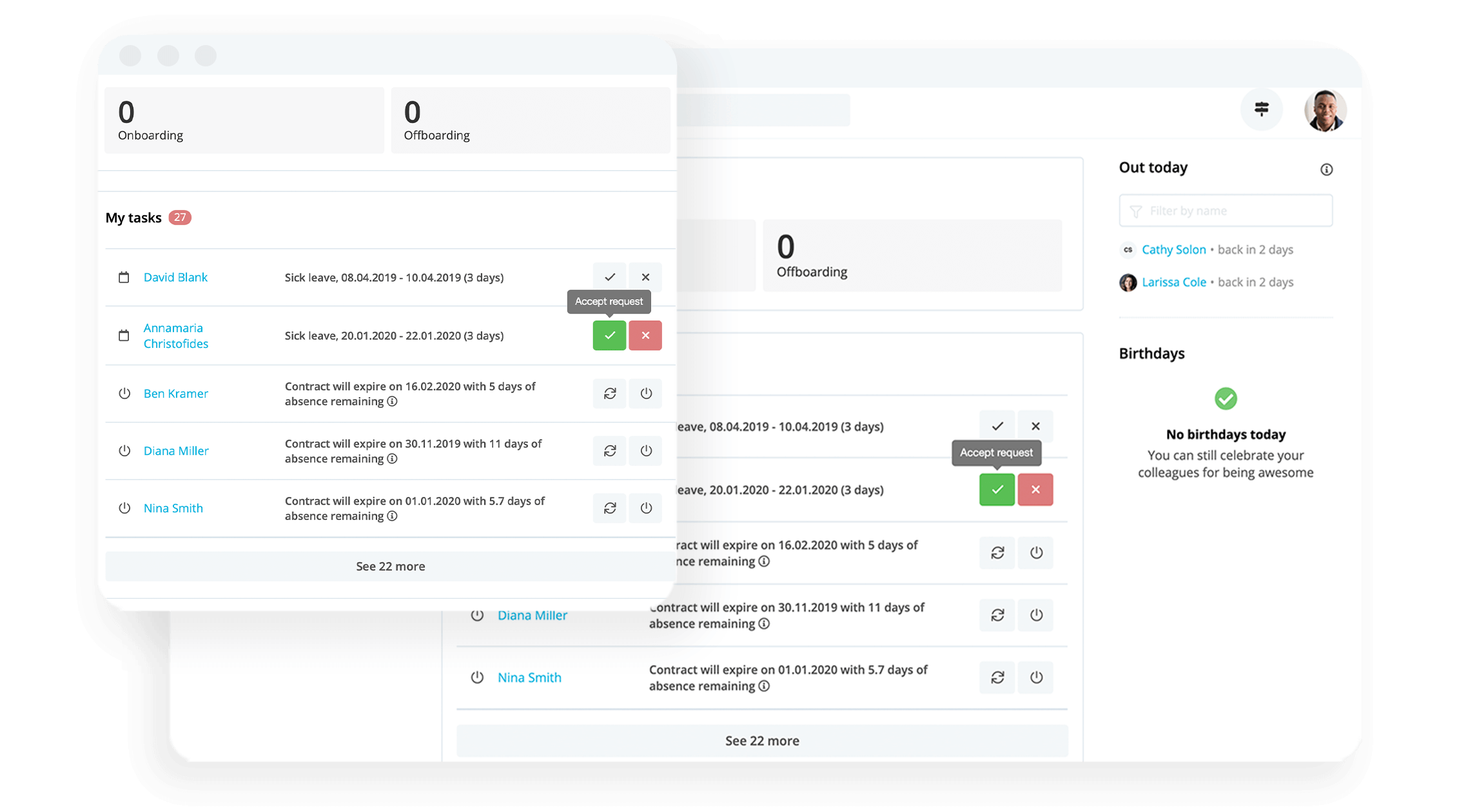
Keep Everyone Organised
Stay on top of all HR tasks and complete them on time, every time.
Create reports in secondsHow Do You Conduct A Return To Work Interview Successfully?

For an employee returning to work after a prolonged absence, a return to work interview can be incredibly valuable. So, it is important for both leadership and HR to understand what it is, what it matters, and how you can create a positive return to work policy.
In this article, we will explore the subject of a return to work interview, how you should conduct them, along with helpful templates to make them easier for your team to execute. We hope you enjoy the read and the benefits of strategic HR initiatives.
What Is A Return To Work Interview?
A return to work interview is a brief, informal discussion with a returning employee. Typically conducted by their manager, it is an opportunity to reintegrate an employee into their team, while keeping them up to date on things that may have changed since their absence began.
For this reason, it helps to host them in a consistent format so every returning employee gets similar treatment.
Why Do Return To Work Interviews Matter?
While it might be tempting to have a returning employee immediately jump back into their work, that's not always the most efficient way to go about a return.
If you have an employee returning from leave due to stress, the likelihood of their situation worsening by simply sending them back to work is increased. Therefore, you need to take your time and ensure a smooth return to work.
Thinking about phased returns to work? Click this link to learn more.
The Benefits of a Return To Work Interview
Beyond the obvious, what other benefits can be derived from this kind of interview? Let’s try to list them out:
Managers can ensure that employees are in a good space to be able to complete their tasks, and that they are not returning too early to work.
Employees feel valued because they are being kept up to date on company and team updates, and how their work was covered while away.
The ways in which their role may have shifted or changed, and how their team has adapted, and what skills they may need to consider moving forward.
Determine whether there is anything work-related that may have contributed to their absence, and what kind of adjustments might need to be made.
Generally, based on their absence, if there are any adjustments that can be made to make their working life more productive.
Determine if their role has fundamentally changed and if they now need further support or a reevaluation of their role, in general.
These are just some of the benefits. One of the main reasons to conduct a return to work interview, though, is to help your employee do exactly that: return to work.
It is an opportunity to brief them, update them, and make them aware of what they need to know to succeed in their role.
Ensure Nothing Gets Forgotten About

Automatically assign tasks to colleagues and track which to-dos are still outstanding. Get reminders of tasks that are due and important dates like probations, work anniversaries and birthdays.
Manage HR Tasks With PersonioAre Return To Work Interviews Legally Mandated?
Do you legally have to conduct a return to work interview when an employee returns from an extended period of absence? By the letter of the law, you do not. That said, it is good practice as it has a wide range of benefits that go beyond simply being necessary.
When Should You Schedule An Interview?
The point of this kind of interview is to ensure that returning employees do not feel overwhelmed. In addition, it is to ensure that any adjustments that need to be made to facilitate their return are done in a timely fashion.
If we keep that in mind, it makes sense that a return to work interview should be conducted on an employee’s first day back at the office. In fact, this should be one of the first and potentially the only large-scale meeting or item on the agenda for that day.
This is to both emphasize the importance of this meeting, while also trying to avoid overwhelming a returning employee with a host of other tasks, meetings, or things they need to handle. This can be the one thing on their docket, and that is good.
How Do You Facilitate A Return To Work Interview?
For HR and managers alike, it helps to keep in mind how to go about facilitating a return to work interview. What should you cover? What questions should you ask? How long should it take?
Let’s start with a loose structure. As a matter of standardization, you should try to keep all of your interviews almost the same. Consider this return to work interview template as a guide:
Welcoming the employee and asking them how they are doing.
Starting with a high-level, company-wide update of anything that has happened.
Go more granular and detail team updates (hires, departures, etc.)
Discuss work-related issues based on their absence.
Dive into any absence policy that your company may currently have.
Discuss any adjustments that need to be made to working conditions.
If relevant, discuss any steps to help prevent future absence.
In general, there is no hard-and-fast rule for how long a return-to-interview should take. It should take as long as it takes to communicate everything that has changed, happened in your company, and how that affects the employee.
Keep in mind, too, that this may be a particularly sensitive time for a returning employee. That is why you should host an interview in a private space, where they can speak their mind and express themselves honestly.
If you keep it too short, you may risk leaving out important details or having the returning employee feel as though their return is stunted. So, while an hour may be a good starting timeframe, you should remain flexible.
Ensure Nothing Gets Forgotten About

Automatically assign tasks to colleagues and track which to-dos are still outstanding. Get reminders of tasks that are due and important dates like probations, work anniversaries and birthdays.
Manage HR Tasks With PersonioEnsure An Effective Return To Work
A return to work interview can serve as one element of a structured and seamless re-onboarding for returning employees. Especially after a lengthy absence, employees may be feeling stressed or unsure of their standing in the company.
Therefore, it is up to both HR and leadership to try and make their return as seamless as possible. This means handling all of the administrative processes, so leaders can focus on what matters: the person returning to work.

